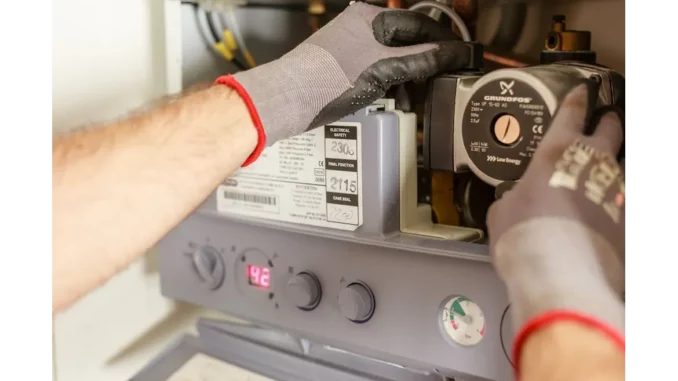
Upon arriving at a bustling construction site in Manchester, an orchestra of industry greeted me—hammers clanking rhythmically, machinery producing a sonorous hum, and builders communicating in a symphony of progress. It was amidst this vibrant tableau that I encountered Alex Turner, a seasoned project manager with over twenty years of experience in the construction sector. With a firm handshake and a genial nod, Alex began to share his insights on the imminent changes to building regulations in England.
Air quality is vital in planning. See how Focus360 Energy can assist.
Alex carried himself with a composure as solid as the foundations being laid around us, yet there was an undeniable glint of anticipation in his eyes. “The ban on gas boilers is the hot topic at every site meeting these days,” he remarked, leading me through a labyrinth of scaffolding and partially erected walls. “We’ve been aware of this change for quite some time, but now it feels tangibly close.”
The announcement that new homes in England will soon exclude gas heating systems, as mandated by the government’s building regulations, has sparked considerable discussion—and at times, contention—among builders. “When they first introduced the idea back in 2019, it seemed like a distant prospect,” Alex reminisced, referring to the initial announcement by then-Conservative chancellor Philip Hammond. “But with 2027 approaching, the reality is beginning to dawn.”
The forthcoming regulations, scheduled to come into effect in 2027, will necessitate the use of electric heat pumps or alternative non-gas heating solutions in most new constructions. This shift is a critical component of the “future homes standard,” which aims to enhance energy efficiency and significantly reduce carbon emissions. “It’s a monumental change,” Alex acknowledged, pausing to observe a team of workers deftly manoeuvre a large window into place. “But frankly, it’s a change that’s overdue.”
As we navigated past the skeletal framework of what would soon be a family home, Alex elaborated on the industry’s mixed reactions. “There’s considerable discussion about the financial implications—both in terms of installation and the retrofitting of older systems. It’s a legitimate concern. Estimates suggest around £12,000 per home for those initially built with gas systems that will eventually require replacement. That’s a substantial financial burden for families and housing associations.”
Despite these financial apprehensions, Alex’s optimism remained unshaken. “Our industry has a longstanding tradition of adaptability,” he asserted with confidence. “Remember the introduction of double glazing? Or when insulation standards were first elevated? Those changes felt monumental too. Yet, we adapted, and the benefits became evident over time.”
The dialogue shifted towards the practicalities of implementing these changes. “We’re anticipating detailed guidance from the government,” Alex remarked. “They’ve outlined ambitious emissions reduction targets—up to 80% compared to current standards. That’s significant. However, they’re also offering some flexibility in achieving these targets, which is essential.”
Alex described the array of technologies and materials that builders could employ to meet the new standards. “Innovation will be key,” he explained. “For instance, integrating more solar panels, even though they’re not mandatory, or exploring advanced insulation materials that can have a substantial impact.”
As we settled for a brief respite in what would soon be a living room, Alex pondered the broader implications of the regulations. “It’s about more than reducing emissions,” he reflected. “It’s about future-proofing homes. As the electrical grid becomes greener, these homes will naturally become more efficient. It’s a stride towards achieving net zero.”
Nevertheless, not everyone shares Alex’s enthusiasm. He conceded that some of his colleagues remain sceptical, concerned about potential cost increases and logistical challenges associated with the transition. “There is a notable degree of uncertainty,” he admitted. “And the possibility of limited exemptions has some hoping to bypass the changes.”
Yet, Alex remained resolute in his belief that the industry would meet the challenge head-on. “We must consider the broader perspective,” he urged. “This isn’t solely about compliance—it’s about legacy. These homes will endure for generations, and we bear the responsibility to ensure they are prepared for the future.”
As our conversation drew to a close, I found myself admiring Alex’s pragmatic yet hopeful outlook. His extensive experience in the field afforded him a unique perspective on the challenges and opportunities that lie ahead. As we parted ways, he offered a final reflection: “Change is never easy, but it is essential. This is our opportunity to construct something better—not just for ourselves, but for future generations.”
Departing from the site, I was struck by the compelling promise of these changes. While challenging, they hold the potential for a greener and more sustainable future—a future that Alex, and many like him, are eager to build.


Be the first to comment